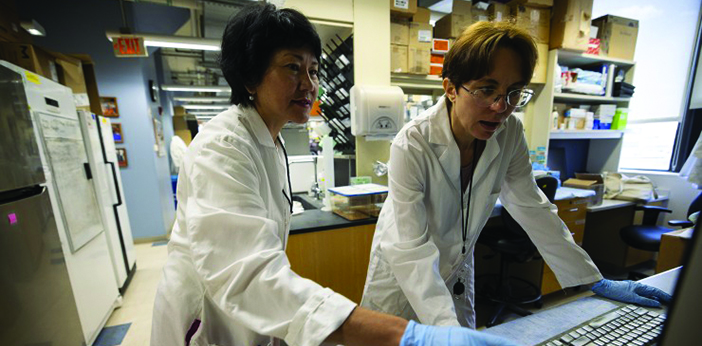Their lives interrupted by war, two visiting physicians conduct cancer research in Providence.
When Russia invaded Kyiv in 2022, the immediate priority for most people in Ukraine’s capital was the safety of their families. For many medical professionals, their second priority was care for the ill and infirm patients they had spent their careers serving.
Nataliia Verovkina, MD, PhD, a medical oncologist at Ukraine’s National Cancer Institute, had been overseeing treatment plans for patients, some of whom required aggressive chemotherapy. With Kyiv under threat, her city was gripped by fear. The NCI remained open, but the chaos made it difficult for hospital staff to get to work. Planned surgeries and non-emergency procedures were paused.
With military action less than five miles from her home in the Kyiv suburbs, Verovkina packed up and drove across the border to safety with her husband, their son, and his grandparents. Yet she couldn’t stop thinking about her patients—those who had been receiving chemotherapy before bombs interrupted, and others suffering from difficult side effects who now had no access to medication. Verovkina and her husband, a scientific researcher, decided to return to Kyiv.
“I really feel a responsibility for my patients, because they were facing double stress: the war and the cancer,” Verovkina says.
Within a week of the invasion, the NCI was able to resume treatment for many patients. Verovkina and other medical professionals took turns sleeping at the hospital because it was safer and more convenient. Kyiv seemed on the verge of capture, and they weren’t sure what each new day would bring.
Like many across the globe, Wafik El-Deiry, MD, PhD, director of the Legorreta Cancer Center at Brown University, reacted with horror to the invasion.
“I felt like we had a moral obligation to help our Ukrainian colleagues in the medical community,” El-Deiry says. “When you see injustice in the world, it moves you to try to do something to help.”
Days after Russian troops entered Kyiv, El-Deiry and other Brown scholars added their cancer research laboratories to a list of international labs supporting Ukrainian scientists.
He connected with staff in the Office of the Provost and the Office of Global Engagement, who partner with rescue organizations, including Scholars at Risk and the New University in Exile, to assist scholars in need of temporary placement opportunities.
In March 2023—about a year after Russia’s invasion of Kyiv—Verovkina and another medical oncologist from the city, Dinara Ryspayeva, MD, PhD, joined El-Deiry at his lab in Providence. With support from the provost’s office, Brown’s Division of Biology and Medicine, and the Legorreta Cancer Center, both now work as assistant visiting professors at Brown, with salary and benefits. And the University worked to ensure that the physician-scientists had visas, housing, health care, and other necessities.
The scholars, both of whom have doctoral degrees, conduct research and assist at Brown’s affiliated hospitals.
“We wanted to create an opportunity here to learn some things that could benefit translational and basic cancer research back in Ukraine and also offer them the opportunity of clinical experiences,” El-Deiry says.




